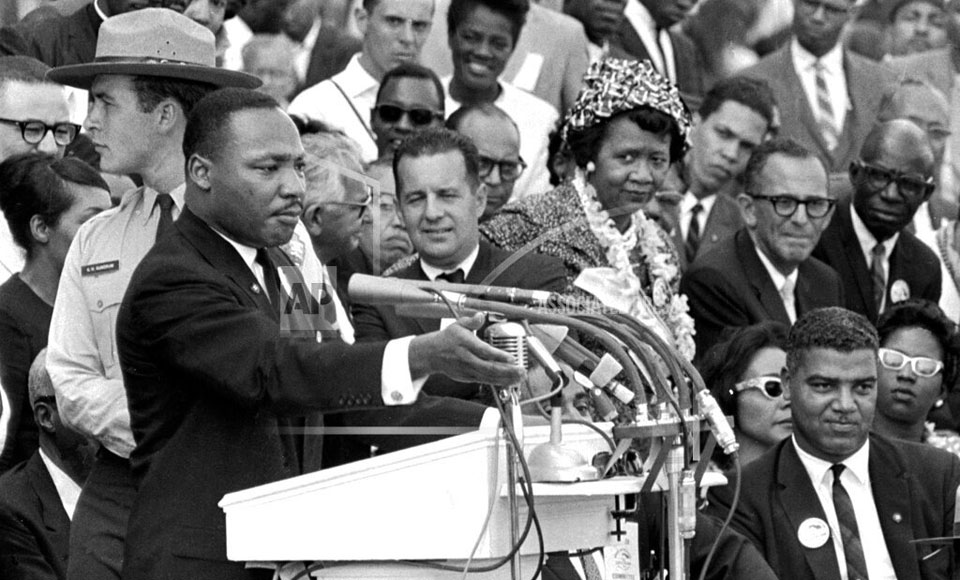
“Again we have deluded ourselves into believing the myth that capitalism grew and prospered out of the Protestant ethic of hard work and sacrifices. Capitalism was built on the exploitation of Black slaves and continues to thrive on the exploitation of the poor, both black and white, both here and abroad.”
—MLK The Three Evils speech, 1967
Today we celebrate the legacy of Dr. Martin Luther King Jr. Many in the United States view Martin Luther King Jr Day as a celebration of the legacy of a leader who stood only for general nonviolent principles: principles based on equality, freedom, and peace for all people.
However, this watered-down view obfuscates not only King’s revolutionary intentions when it came to militarism and capitalism but also King’s deep insight into the economic mechanisms of the capitalist system, which results in inequality and pain for the whole working class. Even when it came to massive peaceful civil disobedience, Dr. King saw that form of struggle as a militant response to oppression designed to force radical change in the system.
Some would turn Dr. King, the anti-capitalist revolutionary into a turn-the-other-cheek liberal.
They have tried to alter a revolutionary Black man and transfer him into a mere shadow of what he really was. Liberals, and even worse, right-wing Republicans now, turn the legacy of King to fit narratives designed to ensure Black people remain servants of their own oppression. This image is also used to affirm the hegemonic ideas of the ruling class. But the disfigurement of King’s legacy, as well as diminishing the importance of the Marxist foundations of the Civil Rights Movement must not be allowed.
As Andrew J. Douglas and Jared A. Loggins’s book Prophet of Discontent: Martin Luther King Jr. and the Critique of Racial Capitalism, pointed out, Martin Luther King was a student of Hegel and he “followed in the dialectical tradition.” King interrogated and deeply analyzed the economic structures of capital as it relates to the social conditions of people, and the Hegelian influence is pervasive and undeniable.
In his 1952 letter to then-girlfriend Coretta Scott King, MLK wrote, in discussing Edward Bellamy’s seminal Socialist novel Looking Backward, “I imagine you already know that I am much more socialistic in my economic theory than capitalistic.” In fact, Before King wrote this letter to Coretta outlining his socialist ideas, he attended Crozer Theological Seminary in Chester, Pennsylvania from 1948 to 1951, where he rigorously studied Capital and the Communist Manifesto. King’s teacher and confidant at the seminary, Rev. J.Pious Barbour stated that King “analyzed the economic side of Capitalism right,” and that King himself believed that seared into the veins of capital was a “system predicated on exploitation, prejudice and poverty, and that we wouldn’t solve these problems until we got a new social order.”
Not only has there been a wholesale blotting out of MLK’s ideological thinking, but there has been a total deletion of Communism as a theoretical and organizational substrate of the Civil Rights Movement.
When we speak of people like the prominent A. Phillip Randolph, “whose political career began as a Socialist Party member and who published a radical magazine, “The Messenger,” as well as being a labor organizer in this country, we ignore this radical history.
When we speak of Bayard Rustin who was in the Communist Party USA in the late 1930s or when we speak of the Southern Christian Leadership Conference (SCLC), the Brotherhood of Sleeping Car Porters, or seminal figures such as E.D Nixon and Stanley Levison, we owe it to them, to speak of Marxism-Leninism. the March on Washington Movement, the Montgomery Bus Boycott, and the Poor People’s Campaign, all at their very substratum, had a rooted Marxist understanding.
When we talk about H-rap Brown, Fred Hampton, Malcolm X, and Harry Haywood, we are talking about Martin Luther King.
The history of the Civil Rights Movement incorporates the history of Black Marxists.
The cooptation of King’s image for the purposes of the liberal acceptance and watered-down demands is all too evident. But the disfiguring of Martin Luther King’s image is also an ontological question for Black people collectively all over the world. What happens to a people when they exist only in the blurred disfiguration of their revolutionary leaders?
When you take a leader of the people and convert them into something unrecognizable, you’re also able to alter their own self-perception and disintegrate their ability to discern what oppression is. Within a movement, this leads to a lack of clarity for what’s needed ideologically and materially to destroy the powers which fuel it.
Our collective intervention must be to remove the plaster of color blind, class blind unity which is a watered-down replacement for Dr. King’s scientific and revolutionary anti-capitalist analysis. We must continue to challenge the associations of King as a leader of all bourgeois and black capitalistic aspirationalism, which lacquers King’s image. Organizers must study, learn and re-educate our communities about the revolutionary history of King and put an end to the liberal “Teddybear-ification” of Dr. King’s legacy.
As with all op-eds published by People’s World, this article reflects the views of its author.

MOST POPULAR TODAY

Zionist organizations leading campaign to stop ceasefire resolutions in D.C. area

High Court essentially bans demonstrations, freedom of assembly in Deep South


Afghanistan’s socialist years: The promising future killed off by U.S. imperialism

Communist Karol Cariola elected president of Chile’s legislature






Comments